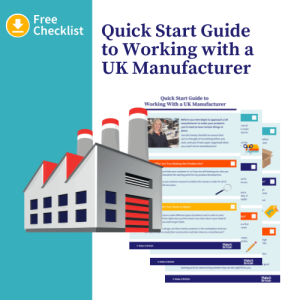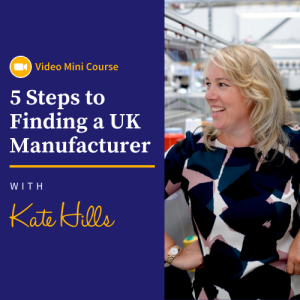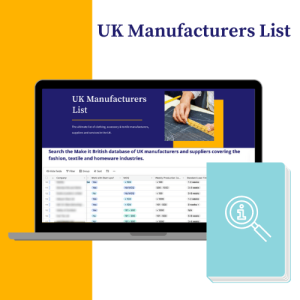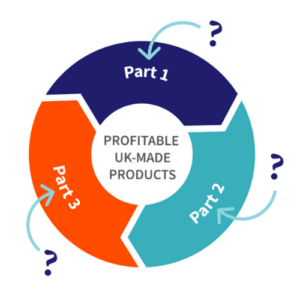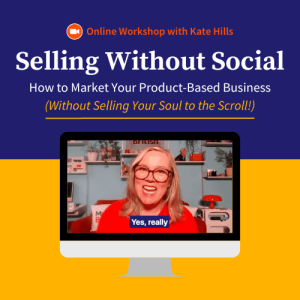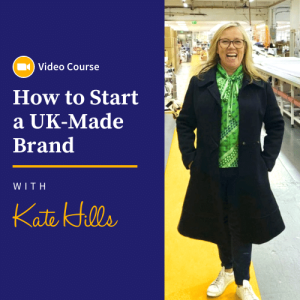How to Choose the Right Manufacturer
Making in the UK has so many benefits, from being able to react quickly to customer demand to having a low carbon footprint. But it’s important to make sure you choose the right manufacturer for your particular business—or it may end up costing you.
In order to help you choose the right manufacturer, I want to give a bit of a warning to you if you are considering getting your products made by someone that approaches you on social media. Or, in fact, any manufacturer that pitches to you out of the blue.
I spoke to someone recently (let’s call her Francesca) who had been sent a direct message on Instagram by a manufacturer. The account of the person that approached her seemed credible. There were photos of people making products on their feed, and other brands they knew were following this account.
The approach came at a time when Francesca was considering outsourcing some of her manufacturing. So after sending a few pictures of what she wanted, and a conversation on WhatsApp, in which the manufacturer sounded confident they could handle the whole thing, Francesca paid up front for an initial sample and was promised she’d have something ready to sell within four weeks.
Six months down the line, and thousands of pounds spent, and Francesca does still not have anything from this manufacturer that she can sell.
Sample after sample was made until the manufacturer got the product to the stage where they could start production. The problem was, the factory had never made something like this before. They didn’t have the right machinery for the job, and their staff were learning as they went.
Whilst the manufacturer was super-apologetic about how long it was all taking, this didn’t help Francesca. She’d sent the factory a lot of raw materials that she’d already paid for up front, and after six months of laying out all this money, but with nothing to sell, her cash flow was scuppered.
Although Francesca was now realising that this manufacturer may not be the right one to make her products in the long term, she had invested so much in this project that there was no turning back.
I knew the manufacturer in question, and to be fair to them, they tried their very best, but this really wasn’t their area of expertise. From what I could work out, the brief they’d been given was not clear from the start, and Francesca had also not been to see them to iron out some of the issues early.
It makes me so sad when I hear something like this, as it is totally avoidable.
If you want to make sure that this doesn’t happen to you, read on to get my tips on how to choose the right manufacturer.
Always visit a factory before you pay them any money
“Do your research wisely and go and visit a few manufacturers before you select the final one. You’re spending a lot of money – would you buy a car without driving it first?”
My recommendation is always to make sure that you do your research wisely. And that you go and visit a few manufacturers before you shell out any money or start working with any of them.
I would never give any money to a manufacturer, whether it’s to make samples or your production, unless you’ve stepped foot in their factory. Go and visit! You’re in the UK; they’re in the UK, hopefully. And if they’re not, you’ll find out when you try to visit them!
Would you buy a car if you’d never driven it before? Probably not. You need to meet the people to see how they are running the factory and to see the workers that are going to make your products.
To see the machinery, how they keep all their raw materials and how organised they are.
When you visit a factory in real life, you understand much more about them and get that gut instinct that you can’t get over the phone or by email. I know it’s all too tempting in this day and age to do everything online, but real connections are made when you meet people in real life.
Get a recommendation to help choose the right manufacturer
“Get a recommendation from someone that has worked with the manufacturer before or knows people that have and who are happy customers.”
Try and get a recommendation from someone who has either worked directly with that factory before and been happy with them or from someone like me, who knows other businesses that have worked directly with that factory and who are happy customers. Don’t just believe Google reviews!
Unfortunately, there are some unscrupulous companies that use all sorts of tricks to get those good Google reviews. For example, asking people to leave a review before they’ve even made a single item, and only on the basis of that first discovery call that they’ve made with them.
Be wary of Google reviews unless they’ve been left by someone you know. And you know that the review has been left after the production run has actually been completed and they were happy with the products and service.
Be cautious of the ‘too good to be true’ manufacturer that approaches you on social media.
“Don’t go for the manufacturer that contacts you on social media – ask yourself how they have the time to do that. The best manufacturers are busy.”
Don’t go straight to a manufacturer that contacts you out of the blue on social media, or just starts following you on social media.
I’ve started to notice a pattern that when I start following someone on social media, certain manufacturers start following them and contacting them too.
If that happens, please don’t think it’s an endorsement from me, just because I follow a manufacturer on social media. It doesn’t mean that they are the right manufacturer right now for your product.
The best manufacturers that I know are too busy to spend lots of time on social media, or actually go out pitching for business on social media.
The best manufacturers are in their factories, making the very best products. So just be wary of social media. Instagram is great for making those initial connections with people, but go and visit them and do your research. Visit several manufacturers, not just the one who contacts you and says, “Yeah, I can make that for you. No problem.”
Agree outcomes before you start
“Give the manufacture a detailed brief or tech pack to start with, alongside an agreement of what the outcomes are.”
My next tip is once you’ve visited a few manufacturers, you’ve done your research, and found one you think is right for you – make sure that you brief them correctly.
Your manufacturer needs to be clearly briefed (that may be with a really good tech pack) and you need to make sure the outcomes are agreed before work starts. So, for instance, if they’re going to make a pattern for you, agree who owns that pattern. Circumstances may change that mean you need to take your production elsewhere, and you will need to own that pattern so it can be used somewhere else.
If you haven’t agreed that with them from the start, then you’re going to have real trouble getting it back from them. And you’re going to have to pay all over again to get the pattern and sample process done somewhere else. Which is why I always say a stitch in time saves nine! Agreeing these things first, and finding the right manufacturer that you can work with to see your product development through, from sample through to production, is going to save you time and money.
Don’t blow your start-up budget all in one go
“Don’t be badgered into buying more than you think you can sell just to get better price. If they can’t do the quantity you need, go to another manufacturer.”
My final tip is to not get badgered into buying more production than you think you can realistically sell, just to get a better price or to meet an MOQ from a manufacturer. If they can’t do the quantity that you need, then just go to another manufacturer. You shouldn’t be told as a small business, or a startup, that you need to spend tens of thousands of pounds on stock to meet a manufacturer’s MOQ.
There are, of course, exceptions to this rule with certain types of products, particularly things like fabrics. For example, if you need a bespoke colour dyed on a fabric, then the minimum order quantity for that is likely to be high. When it comes to something like dying, they’ve got to fill the drum with a certain quantity of fabric, but this is why you need to ask around. Do your research and make sure that you are not being cajoled into buying more than you need, and that there is a genuine reason for the MOQ.
What do you do if you have started work but you didn’t choose the right manufacturer?
What do you do if you are in a situation where you’ve already started down the line with a manufacturer? You’ve already spent a lot of money, and you don’t think that it’s going to work out. You’ve just got that gut feeling. Do you cut your losses or do you carry on?
Do you stick your head in the sand and hope it’s going to turn out alright, because you’ve already spent thousands of pounds? Now, generally, I would say it’s better to go with your gut instinct, walk away now, chalk it up as a mistake. In business, making mistakes is how we actually learn. It’s sad that it’s happened, but it’s better to walk away than to throw more good money after bad.
The next time you select a manufacturer, do it after researching thoroughly. Make sure that you pick the manufacturer that’s right for you, not the manufacturer that has picked you.

